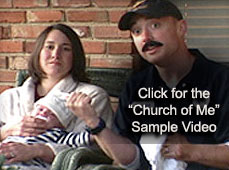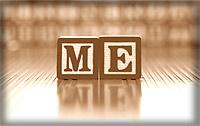Follow the way of love and eagerly desire spiritual gifts, especially the gift of prophecy. For those who speak in a tongue do not speak to other people but to God. Indeed, no one understands them; they utter mysteries by the Spirit. But those who prophesy speak to people for their strengthening, encouragement and comfort. Those who speak in a tongue edify themselves, but those who prophesy edify the church. I would like every one of you to speak in tongues, but I would rather have you prophesy. Those who prophesy are greater than those who speak in tongues, unless they interpret, so that the church may be edified (1 Corinthians 14:1-5 TNIV). ... Everything must be done so that the church may be built up (1 Corinthians 14:26).
When George Michael goes to church, he doesn't have to go far.
Mr. Michael (not the singer of the same name) recently informed the village of Lake Bluff, the wealthy suburb of Chicago in which he lives, that he was not liable for the nearly $80,000 in property taxes that he owes on his $3 million dollar mansion because he has converted the home into the Armenian Church of Lake Bluff.
To get the exemption, Michael showed the State of Illinois his clergy license from the Church of Spiritual Humanism (which he apparently got online), photos of an altar, church bulletins and by-laws, and other necessary documentation. He even put up a cross on the side of the home. Michael says he started the church because his wife and daughter are disabled and so can't get to their regular church in Chicago.
The Village and the County Review Board are skeptical. Certainly, the whole thing would be much more convincing if Michael wasn't already in debt and facing a lawsuit in a business matter. Then there are the numerous signs on his property in a subdivision near a golf course that say "No Trespassing" and "Private Property." Neighbors haven't reported seeing anything that looks like Sunday services happening, either.
Michael insists, though, that the house is now owned by the Armenian Church of Lake Bluff, though that might not convince anyone, either. The Diocese of the Armenian Church of America has no record of such a church. Meanwhile, Village officials have notified Michael that if he is running a church, he'll need to pay more than $115,000 in fines, since opening a church in an area zoned as "country estate residence" requires a special permit. It seems that the Village will likely get paid, one way or the other.
Maybe Michael didn't think of that.
Before we get too judgmental toward Mr. Michael, however, maybe we should stop and take a look at ourselves. I would guess that he's probably not the only one who's ever looked for sanctuary in the Church of Me. Maybe none of us are looking for property-tax relief, but something about us makes us sort of quick to ask what the church has done for us lately. Are my needs being met? Are my suggestions being heard? Do I like the music and the preaching? Are there plenty of well-staffed, quality programs for my kids? Are there lots of people like me who I don't have to work too hard to relate to?
The Church of Me: Where I can be served but don't have to serve others.
The Church of Me: Where the only music is the kind I like.
The Church of Me: Where everyone will treat me like a member of the family on Sunday and leave me alone the rest of the week.
The Church of Me: Where the perks are many and the demands are few.
The Church of Me: Where it's less about the Way and more about My Way.
When Paul wrote his first letter to the church at Corinth, they were quickly becoming the Church of Me. They argued about which preachers they liked best. Fought about when to start the church potlucks. They argued about whether marriage was allowed and which spiritual gifts were the most important. They bickered about whose turn it was to lead a song or give a prophecy. That's why Paul has to remind them that they are to be far more concerned about the church as a whole than themselves. "Everything must be done so that the church may be built up," he writes them. If it comes down to a choice between doing something to edify yourself and doing something to edify the church — and it will come down to such a choice, from time to time — he says that every time you should remember that you're a part of the church that belongs to Christ, and not the sole member and head of the Church of Me.
If you've ever wanted to hold on to traditions or ministries you like, even when they interfere with the lost hearing the gospel or fellow Christians growing closer to Christ, then you've felt the pull of the Church of Me.
If you've ever resisted learning  to appreciate (or tolerate) new styles — or old styles — of worship music because they aren't your style, even though some of your brothers and sisters in Christ are clearly encouraged and finding in them a language in which they can worship God more intuitively, then you've felt the pull of the Church of Me.
to appreciate (or tolerate) new styles — or old styles — of worship music because they aren't your style, even though some of your brothers and sisters in Christ are clearly encouraged and finding in them a language in which they can worship God more intuitively, then you've felt the pull of the Church of Me.
If you've ever resisted getting to know a brother or sister because you weren't comfortable with him or her, then you've felt the pull of the Church of Me.
If you've ever been quick to demand service from church and slow to offer yourself to provide one, you've felt the pull of the Church of Me.
So what do we do about it? It's simple, in theory if not in practice. In Jesus' church, we have to check "Me" at the door. We remind ourselves, over and over, that it's about Jesus and his Body, not about Me. It's about how we fit in with Jesus' work in the world, not about how it fits in with Me. We take the risk of putting our interests aside and tending to the best interests of our sisters and brothers, believing that they will be tending to our interests and that, even if our interests get lost along the way, our Lord will not overlook our sacrifices.
The Lord. It will help us to remember that the church is his property, that he bought it with his blood and that if we are a part of it there is no hiding from our debt to him and to his people.
We need a pronoun change. The church is about Him and Us. Never Me.









Reader Comments
Archived Facebook Comments